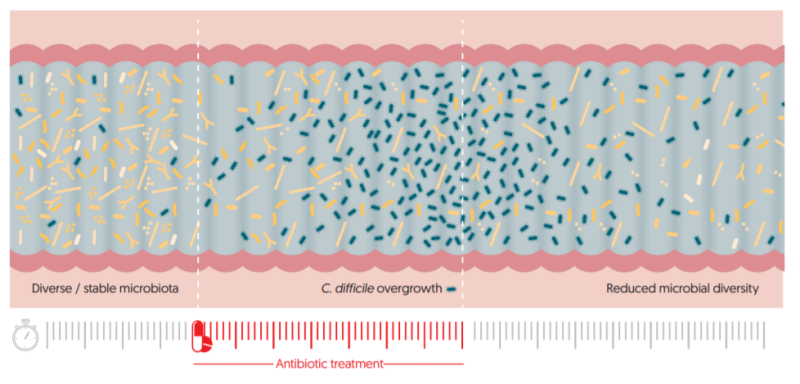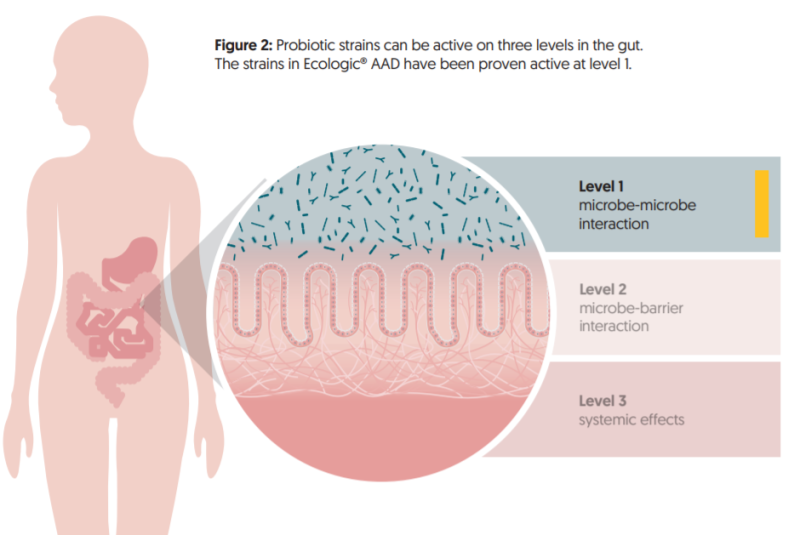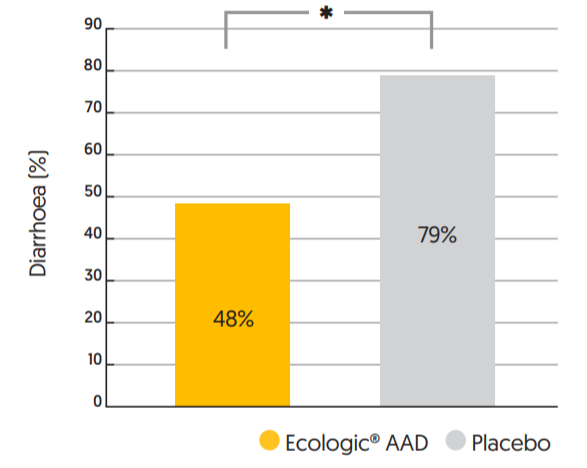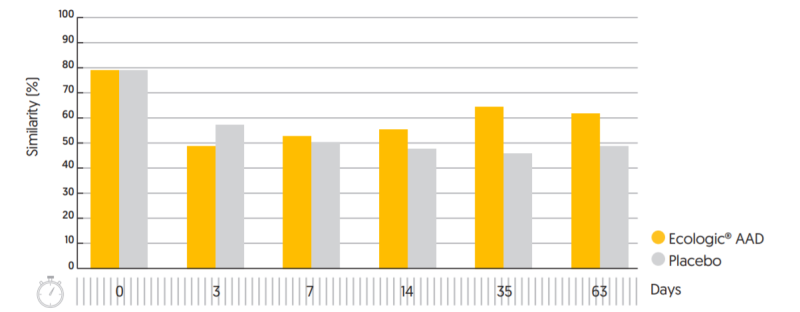Knowde Enhanced TDS
Identification & Functionality
- Ingredient Name
- Food Ingredients Functions
- Pharma & Nutraceuticals Functions
- Ingredients
- Bifidobacterium Lactis, Lactobacillus Paracasei, Lactobacillus Acidophilus, Lactobacillus Salivarius, Bifidobacterium Bifidum, Enterococcus faecium, Lacticaseibacillus rhamnosus, Lactiplantibacillus plantarum
Features & Benefits
- Product Background
Bacterial infections are often treated with antibiotics. It is generally known that antibiotic intake can cause a marked disturbance of the intestinal microbiota, as antibiotics do not only affect the targeted pathogens, but the indigenous microbiota as well.
Figure 1: Antibiotics have a profound impact on the intestinal microbiota. They cause a temporary decrease in microbial diversity leading to loss of colonization resistance and overgrowth of potential pathogens such as C. difficile.

A disturbance of the intestinal microbiota can lead to overgrowth of potential pathogens, which may result in the development of antibiotic-associated diarrhea (AAD) (figure 1). The incidence of AAD ranges from 5-39%.2,3 AAD can be divided into two types: nonspecific AAD which is usually mild, and Clostridium difficile associated diarrhea (CDAD), which can lead to severe and life threatening pseudomembranous colitis1 . It was widely assumed that this disturbance of the intestinal microbiota was short-term, but nowadays it is accepted that antibiotics can profoundly affect the intestinal microbiota over a long period of time.4 Moreover, there is growing evidence that these antibiotic induced disturbances of the microbiota play an important role in a multitude of disorders such as irritable bowel syndrome (IBS), inflammatory bowel disease (IBD), allergy, obesity and colorectal cancer.5 Therefore, preventing or restoring this disturbance is of great importance. The medical world is just now starting to accept that, even if AAD is not present, antibiotic treatment can cause a marked and prolonged disturbance of the microbiota leading to health issues in the long term. Ecologic® AAD has shown to be effective in preventing AAD and in restoring antibiotic-induced microbiota peturbations.
- Strain Selection
Ecologic® AAD is a multispecies probiotic formulation, developed to prevent and restore antibiotic-induced disturbances of the microbiota and subsequently the risk of antibioticassociated side effects, such as AAD. The formulation consists of 9 specially selected probiotic strains. Probiotic strains can exert health effects at different levels in the gut (see figure 2). The bacterial strains of Ecologic® AAD have been selected for their capacity to inhibit AAD-related pathogens (level 1). The bacterial strains have been screened for their capacity to inhibit growth of the pathogens:
- Clostridium difficile
- Clostridium perfringens
- Entercoccus faecalis
- Escheria coli
- Bacillus subtilus.

Applications & Uses
- Markets
- Food & Nutrition Applications
Properties
Regulatory & Compliance
- Certifications & Compliance
Technical Details & Test Data
- Clinical Evidence
Ecologic® AAD has been tested in a randomized, double-blind, placebo-controlled trial with healthy volunteers taking amoxicillin, performed by Maastricht University Medical Center, The Netherlands5 . The trial showed that Ecologic® AAD significantly reduced the risk of diarrhea-like defecation (figure 3). It was also shown that the intestinal microbiota of participants in the probiotic group restored faster to the pre-antibiotic state than the intestinal microbiota of participants in the placebo group6 . The results therefore suggest that restoration of the intestinal microbiota is one of the important mechanisms determining the efficacy of probiotics in AAD (figure 4). Ecologic® AAD was also able to stimulate the production of cytokine secretory IgA (sIgA), an important immunoglobulin for the general defense against pathogens. This result has been confirmed in a user trial in Austria with 199 participants. Hospitalized patients on antibiotics received Ecologic® AAD which resulted in a significantly lower incidence of AAD. Less than 1% in the entire study group developed AAD7 , which normally ranges between 5-39%. Furthermore, in a retrospective case report series of 10 patients with C. difficile infection (CDI), of whom 5 experienced recurrent CDI, twice-daily supplementation with Ecologic® AAD, besides antibiotics, resulted in complete recovery.8 Ecologic® AAD is recommended by the World Gastroenterology Organization in their Global Guidelines (feb 2017). The level of evidence on reducing antibiotic-associated diarrhea is evaluated as level 2 evidence: Randomized trial or observational study with dramatic effect.9
Figure 3: Diarrhea-like defecation occurred significantly less in the Ecologic® AAD group compared to the placebo group
 Figure 4: After day 35 there is a significantly faster recovery to the pre-antibiotic state of the microbiota in the Ecologic® AAD group compared to the placebo group
Figure 4: After day 35 there is a significantly faster recovery to the pre-antibiotic state of the microbiota in the Ecologic® AAD group compared to the placebo group

